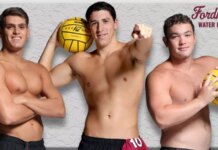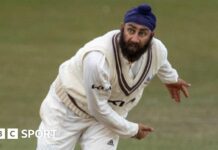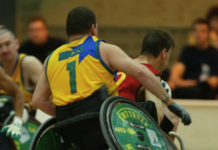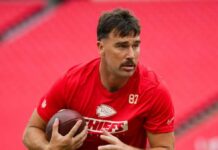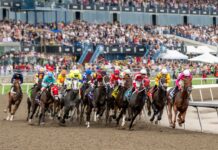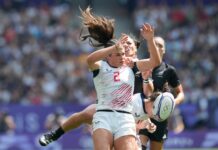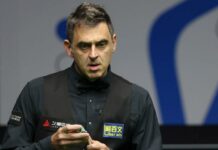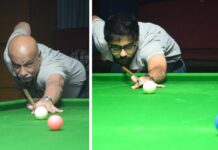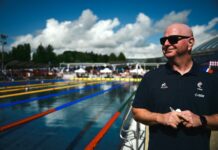This is Caeleb Dressel: a seven-time Olympic gold medalist who holds American records in the 50- and 100-meter freestyles as well as the 100-meter butterfly. In other words, an absolute swimming legend.
This is also Caeleb Dressel: “Every time I step onto the blocks, I’m scared.” In other words, he’s an elite athlete who grapples every day with being just that.
If the pandemic-delayed Tokyo Olympics were the Mental Health Olympics, then the Paris Games that begin this week are merely the sequel. Simone Biles, the unmatched and iconic gymnast who couldn’t get her brain to allow her body to pull off her normal routine in Tokyo, is back for another try. Noah Lyles, one of the world’s fastest sprinters who broke down after winning bronze in the men’s 200 meters in Tokyo — overcome by all he had, mentally, overcome — returns for more medals. The searing, quadrennial spotlight is back, and athletes are stepping into it with a mix of excitement and trepidation that is better understood now.
Enter Dressel. In Tokyo, he swam in five events. He won gold in all five. Yet when the U.S. trials began last month, there was no guarantee he would qualify for the team. During his eight-month break from the sport, he wasn’t sure he would get back in the water again.
“It was definitely a thought of whether or not I would return,” Dressel said during a Zoom call this month from the U.S. swim team’s training camp in Croatia. “There were just many, many months where I wasn’t sure what I was going to do. It wasn’t a question I was asking myself, because it wasn’t something I was really thinking about.”
Which makes his standing as a third-time Olympian — not to mention a threat for more medals — all the more unlikely. Swimming isn’t like, say, basketball, a sport in which a player could take off months or even years and feel relatively confident that her or his jump shot would return. In swimming, months away from training are months others are putting in the work. There’s no snap-of-the-fingers way to catch up.
Though he did not go into specifics about his mental health issues, Dressel acknowledged he is a different person and athlete now than the Tokyo version. At the trials last month in Indianapolis — after he won the 50-meter freestyle, meaning he had qualified in two individual events and put himself in position to swim two relays as well — he spoke eloquently and longingly about the days when he was 10 and it was just him and the water and his buddies, none of the rest of this stress.
At 27, he’s working on it all.
“I feel like I’ve gotten a better relationship with myself — and the water, for that matter,” Dressel said. “But then again, the water’s never really been a problem. It’s some of the baggage that comes with it. So there’s things I’m still working on, things I still need to work on, and things I’ve gotten much, much better at. I’m still working on things. There’s parts that I absolutely love about the sport. I adore the water. It’s one of my favorite relationships that I have. It’s always fun in the water. And then there’s things that I don’t like, things I hate about the sport.
“So I’m just working on really digging into the parts of the sport that I love and working around and working through the things that I don’t particularly enjoy about the sport.”
Dressel will be examined as a person dealing publicly with mental health struggles because he is an Olympic athlete and this is an Olympic year. But put swimming aside: He said he simply needed to deal with what ate at him, what wore him down, because he is a human being. He is a husband to Meghan and a father to infant son August. The son of a veterinarian, he gains comfort from Rems, his 9-year-old cat, and Jane, his 6-year-old English lab.
He has taken to therapy and has made it a priority for himself and his team to talk regularly so they notice “red flags” that might trigger his issues. He has found joy in training. Even on the days he might not swim as fast as he wants — and he is grappling with the idea that he never again will match his personal bests — elements of the sport actively make him happy again.
So back to the pool. And getting on the blocks. And being among the most decorated Olympians in these Games. And being … scared. He has learned that beating it back doesn’t help. He has learned that embracing it is more productive, not to mention more honest. He will use, as he said, “the tools in the toolbox” each times he makes that climb, almost certainly beginning Saturday in the 4×100-meter freestyle relay.
“I think just being okay with that and acknowledging that emotion and knowing that it’s worked for me — but I think just pinpointing that and giving it a name — has been a lot more comforting for me,” he said. “But [also] not getting rid of what I feel like … made me great.
“Yeah, every time I step on the blocks, it’s scary — whether or not I’m thinking that I could lose or I can embarrass myself or I could let someone down. It’s just thoughts that come with it, and it’s just something I think that’s innately in my genetics or system.”
Which, even before the Paris Olympics begin, is a reminder — and not just about Caeleb Dressel. More than 10,000 athletes are assembled for these Games. Even the best among them have issues of their own. Talking about them isn’t a sign of weakness. It’s a path to strength. “The obstacle,” Dressel said, “doesn’t seem as, as … scary.”
Source link : https://www.washingtonpost.com/sports/olympics/2024/07/22/caeleb-dressel-mental-health-paris-olympics/
Author :
Publish date : 2024-07-22 14:48:53
Copyright for syndicated content belongs to the linked Source.



